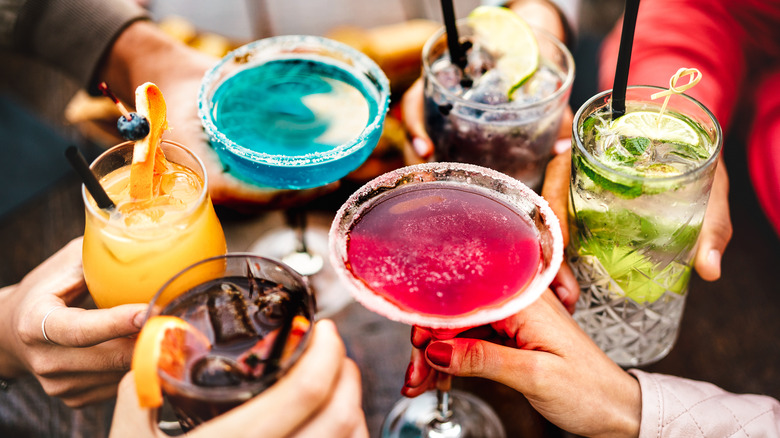What Sort Of Diet Should You Follow If You Have POTS?
Postural orthostatic tachycardia syndrome (POTS) is a condition where your heart rate increases and you feel lightheaded upon standing up from a sitting or lying down position (via Cleveland Clinic). Typically when you stand up, blood begins to shuttle to the lower half of your body. To respond to gravity, your body releases epinephrine and norepinephrine to help pump your blood back to your heart and brain. These hormones cause your heart rate to increase as your blood vessels constrict.
Blood vessels have a harder time responding to this pull of gravity in people with POTS. Therefore, their bodies release more of these hormones because they have more blood below their heart to move upwards. Their heart rate increases as their blood vessels try to move this blood. That means less blood going to the brain.
People with POTS might experience a range of symptoms such as dizziness, fatigue, nausea, headaches, and disrupted sleep. These symptoms may be worsened by standing for prolonged periods, engaging in strenuous exercise, or being sick. According to a 2022 study in Heart Rhythm, as many as 14% of people developed POTS after a COVID-19 infection.
Although there's no cure for POTS, Cleveland Clinic says symptoms can be managed through an exercise and diet plan tailored to your symptoms. However, there are some general dietary recommendations for people with POTS.
What to include in your diet if you have POTS
According to GoodRx, managing your blood pressure can help with symptoms of POTS. Drinking water can raise your blood pressure and improve blood flow to the head, which can help with dizziness. Adequate fluid for males is about 15 cups a day and 11 cups for females; but your environment, activity level, and overall health might warrant more or less (via Mayo Clinic). Remember that your food can contribute to 20% of your fluids. Even though many people are encouraged to reduce the amount of salt in their diet, people with POTS need as much as five times more salt daily than an average person. That's because sodium increases blood pressure. Be sure to ask your doctor how much sodium is appropriate for your condition.
People with POTS should also avoid large, heavy meals because that means more blood is required for digestion. It's best to opt for several smaller meals throughout the day. Your meals should include foods high in fiber and antioxidants (such as oats, fruits, and vegetables). Prebiotics (such as beans) and probiotics (such as yogurt) help improve your gut microbiome.
What to avoid if you have POTS
According to MyHeart.net, people with POTS should eliminate alcohol from their diet because it interferes with the regulation of their blood pressure. Alcohol might lower blood pressure because it hinders the tightening of your blood vessels, leading to a slower return of blood back to your heart and head upon standing. Alcohol is also dehydrating, so that glass of wine or beer might set you back on your daily hydration needs.
Some people with POTS might experience worse symptoms when eating gluten or dairy. Check with your doctor to see if a gluten-free or dairy-free diet might benefit you.
You might also want to avoid energy drinks with guarana and caffeine. A 2008 case study in Clinical Autonomic Research found that POTS symptoms disappeared after a volleyball player eliminated Red Bull from the diet. According to Dysautonomia International, some people with POTS might benefit from caffeine, while others might see their symptoms worsen. It's always best to see how caffeine might affect your POTS symptoms.
GoodRx also suggests eliminating FODMAPS (fermentable oligosaccharides, disaccharides, monosaccharides, and polyols) from your diet, especially if you have gastrointestinal problems. FODMAPS are difficult to digest and include foods like onions, some nuts and legumes, grains with gluten, foods with lactose, apples, high-fructose corn syrup, and mushrooms.
You might also see your POTS symptoms improve if you limit ultra-processed foods, added sugars, and artificial sweeteners.



